Search News

Household wealth has only recovered about half the $16.4 trillion lost in the Great Recession.
NEW YORK (CNNMoney) -- One reason that the U.S. economy still struggles to achieve sustained growth is that Americans are a long way from recovering the trillions of dollars of household wealth lost during the Great Recession.
U.S. household wealth fell by about $16.4 trillion of net worth from its peak in spring 2007, about six months before the start of the recession, to when things hit bottom in the first quarter of 2009, according to figures from the Federal Reserve.
While a rebound in the stock market, an improved savings rate and consumer steps to reduce debt resulted in net worth gains since 2009, only a little more than half of that lost wealth - $8.7 trillion -- is back on household balance sheets.
That leaves American household wealth $7.7 trillion less than it was before the recession.
"The huge loss of consumption is due to loss of $8 trillion in bubble wealth," said Dean Baker, co-director of Center for Economic and Policy Research.
The gap that remains in household wealth is in stark contrast to the nation's gross national product, the broadest measure of economic activity, which has recovered all of the lost output of the recession. And the wealth gap helps to explain why consumers are still so reluctant to spend a full two years after the official end of the recession.
Much of the lost household wealth came from declines in the value of real estate, which dropped $6 trillion, or nearly 30% of its value, from the end of 2006 to the end of last year. And after posting modest gains in 2009 and the first half of 2010, the value of homes started to fall again in mid-2010.
The most recent figures from the Fed, released Thursday, showed real estate lost another $339 billion in value in the first quarter. That was partly offset by a $68 billion decline in the total owed on mortgages, the main driver of a $74 billion reduction in overall liabilities.
The stock market, which has come off its peaks recently, helped households by adding $885 billion in the value of stocks and mutual funds during the quarter. Overall net worth increased by $943 billion in the quarter.
Experts say the loss of wealth has been a transformative event for most Americans, changing their attitudes on spending, saving and the value of owning a home rather than renting.
"I think the absolute decline in household wealth resulted in a decline in confidence about the future," said Barbara Whitehead, director of the Templeton Center for Thrift and Generosity. "Most experts agree (that), over the long term, Americans are going to save more." She said that while she wants to see savings increase, in the near term it doesn't help get the economy going again.
During the bubble years, home values were an important source of income in many household budgets, as homeowners used home equity lines to supplement their stagnant wages. That activity resulted in the savings rate falling to nearly zero, as many Americans spent more than they brought home in after-tax income.
So the economy won't see the benefit of consumers spending at that level again anytime in the foreseeable future.
"Why are we surprised that they're not spending? They were spending based on wealth that isn't there now," said Baker. ![]()
| Overnight Avg Rate | Latest | Change | Last Week |
|---|---|---|---|
| 30 yr fixed | 3.80% | 3.88% | |
| 15 yr fixed | 3.20% | 3.23% | |
| 5/1 ARM | 3.84% | 3.88% | |
| 30 yr refi | 3.82% | 3.93% | |
| 15 yr refi | 3.20% | 3.23% |
Today's featured rates:
| Latest Report | Next Update |
|---|---|
| Home prices | Aug 28 |
| Consumer confidence | Aug 28 |
| GDP | Aug 29 |
| Manufacturing (ISM) | Sept 4 |
| Jobs | Sept 7 |
| Inflation (CPI) | Sept 14 |
| Retail sales | Sept 14 |